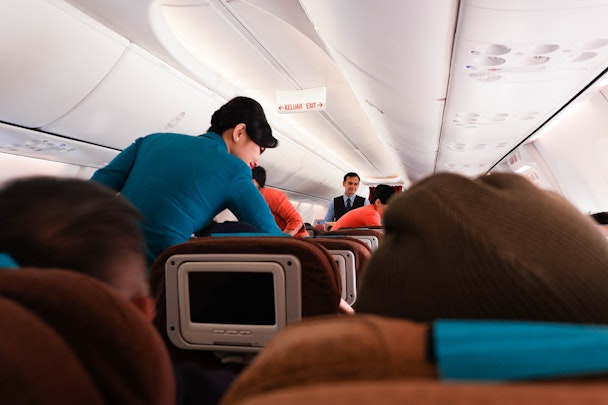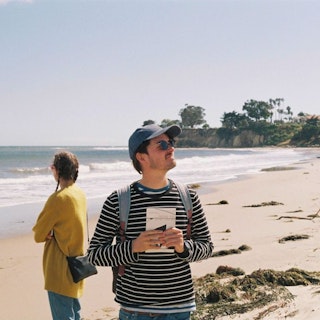What I learned… as cabin crew, with Rebecca Hull of TPXimpact
In our series What I Learned, we dig into the backstories of agency leaders, from the sensational to the surprisingly interesting. Today’s tale from Rebecca Hull, managing director for digital experience at TPXimpact (following the merger of the former Panoply group of companies, including Manifesto), falls into the second category. Before her career in digital transformation, she was cabin crew for British Airways (BA). We sat down to talk about the journey from airline to agency.

Rebecca Hull of TPXimpact on the transferrable skills gained from working as cabin crew
Hi, Rebecca! We know you from TPXimpact, but I understand you’ve had some varied roles
Yes. I’ve worked client-side; I’ve worked in digital transformation for not-for-profits. I’ve worked at Vodafone, in the travel industry, in financial services... This is my first agency gig.
What exactly do you do now?
I head up digital experience. It’s a 110-person business, offering the full set of design and build services.
And you started your professional life in the skies?
Yes. Going back, I was the first person in my family to go to university. I was very much discouraged; I was told that I should go to secretarial college. My first act of rebellion was to go to university.
I come from a pretty poor background. When I left university, I had no money and it was during a recession. I took the only job I could get, for the Japanese company Sogo with a department store in Piccadilly.
My boss was like Anna Wintour, very high-end fashion, an archetypal fashion bitch. A big part of the job was taking abuse from her. It was full of ritual humiliations: I had to model the wedding dresses when their buyers would come in. I would strut up and down the office in ridiculous wedding dresses, with all these men smoking cigars and drinking whiskey.
One day, I was going to see someone in Liverpool, and I bought Cosmo magazine. In the back of the magazine was an ad from BA, advertising for people who spoke languages. I could speak some French, so I applied. I got the job, flying long-haul cabin crew. I flew for about four years.
Did you enjoy it?
I loved it. It set me up for work in so many ways – you’re trying to manage uncertainty and a lack of resources in a very time-bound, constrained environment.
Every time you went to work, you flew with different crew. You meet new people constantly. That teaches you social agility. Sometimes the chemistry is amazing, and magic happens.
You’re witness to a lot of stories. When you’re on a long-haul flight and everyone’s asleep, people will come and sit with you and tell you their life story or why they’re flying. When people fly there’s a feeling of real vulnerability. There’s a phenomenon where you’re more likely to cry at altitude.
A pretty enviable job in many ways...
I traveled in 747s, which were glamorous. I used to go up the stairs and feel like I was entering a very rarefied world.
I was really proud of it. BA was the national carrier, so we’d often fly sports teams and such. There’s quite a bit of national heritage tied up with that brand.
But the work is not glamorous. The work is dirty and hard and stressful, and involves a lot of bodily fluids.
What non-glamorous jobs does that role really consist of then?
Your predominant function on the plane is to keep passengers safe, to keep that aircraft set and to get people out in an emergency. Everything else is just filling time. People think that you’re there to give out drinks; you’re not really. You’re there to help the guy who’s having a heart attack in 28C. Anything could happen and you have to be ready to respond to that.
That sounds a bit like running a business...
You learn about life, you learn about people, you learn how to get the best out of someone. You’re having to manage your team; you’re having to please your clients; you’re having to maintain the reputation of your business; you’re having to be careful with your resources. It’s absolutely like business school.
It also taught me to manage stress and to keep things in perspective. Not just turbulence and tragedy – when you’re at the back of an aircraft, and you realize that you’re five meals short and the person in the back row has already been an asshole. You’ve got to keep your cool. You can’t get angry, you can’t cry. You just figure it out.
Would you recommend flying to a younger colleague?
If any of my daughters said to me, I’m going to become cabin crew, I would say go and do it. But the same could be true of any frontline customer-facing work. Some of the best project managers that I’ve had, some of the best staff that I’ve had, have done a few years of shitty jobs. You learn a lot of compassion and tolerance.
Do you actively look for that in CVs?
Absolutely. I was talking to a friend’s nephew who was wondering about getting a master’s because maybe that’s what employers want. I’m not sure it is. I definitely don’t think that because you’re a graduate you’re any more likely to succeed in the workplace; I don’t want to make a degree a requisite. Just learning about life is brilliant experience.
What made you come down from the air?
Your life becomes very transient; you’re working with different people all the time; your schedule is never consistent. You end up missing a lot at home. You can start to feel very scattered.
I took a contract with BA for a digital transformation program that they were running around their loyalty program. And the rest is history.
Content created with:

TPXimpact
TPXimpact believes in a world enriched by people-powered digital transformation. Working in collaboration with organisations, we're on a mission to accelerate positive...
Find out more
